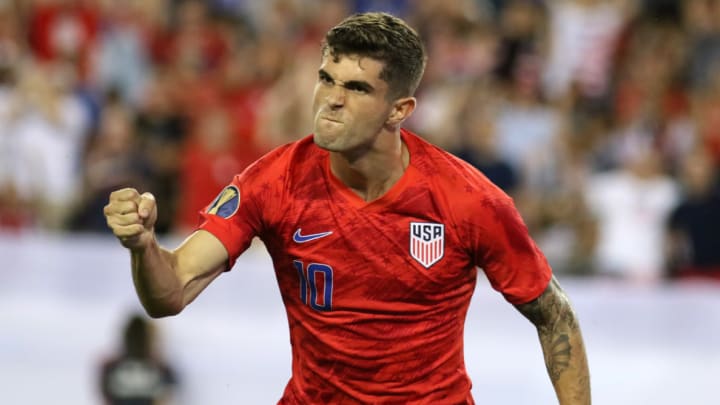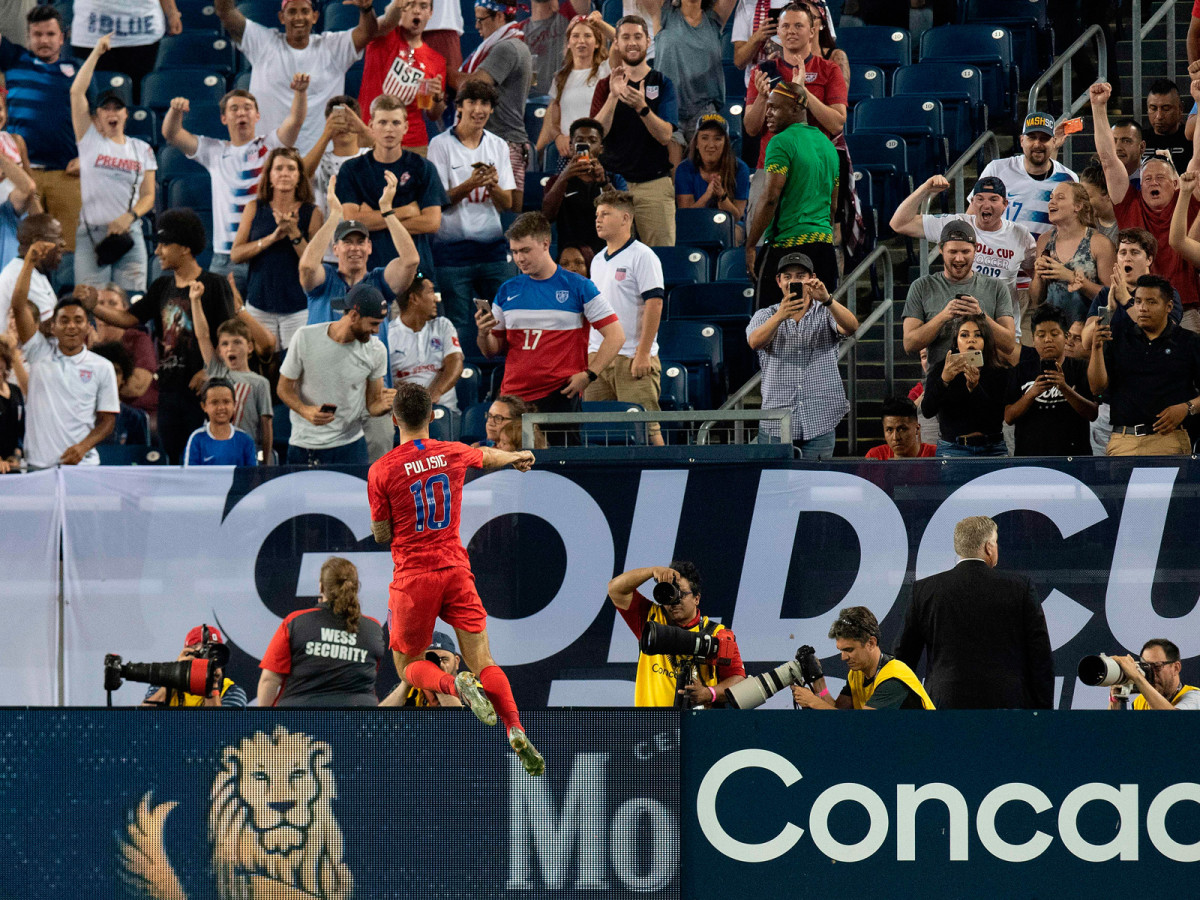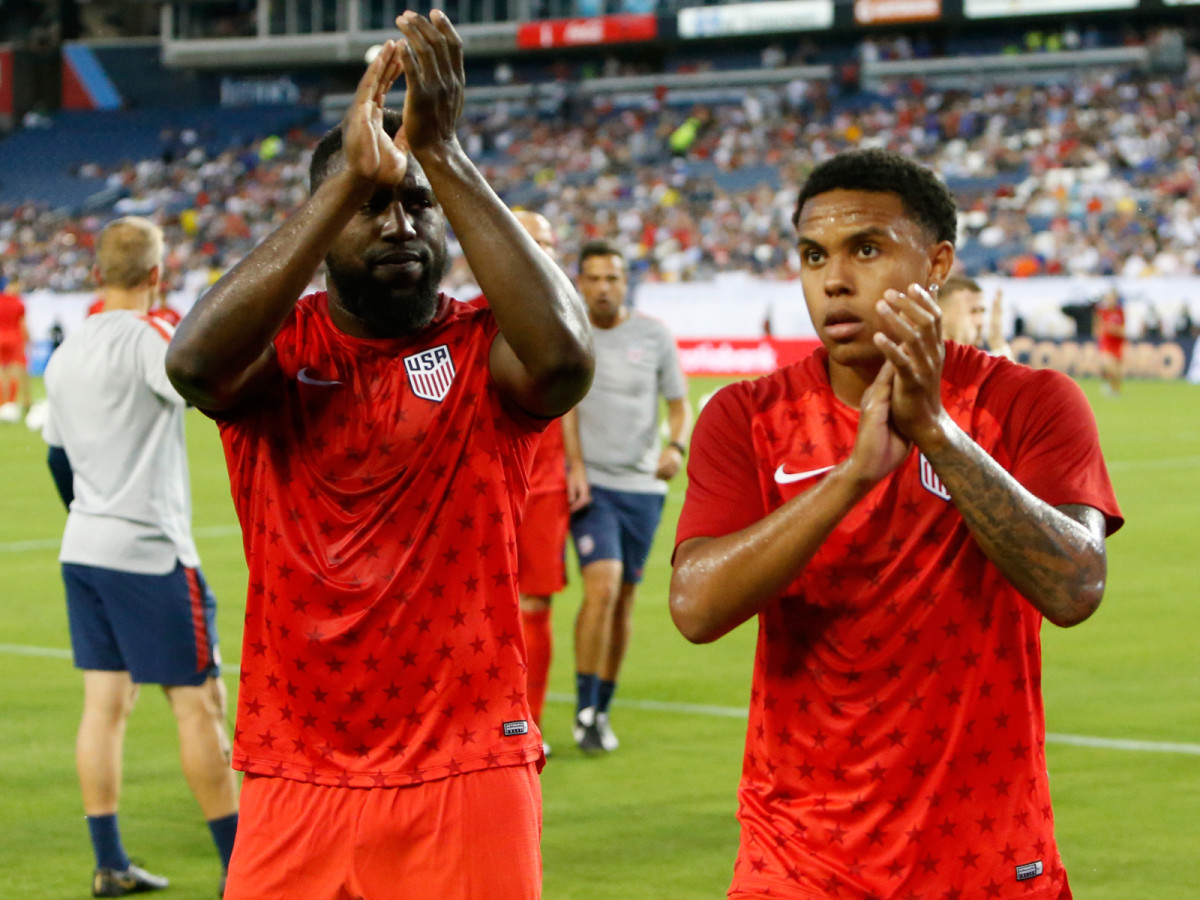After Handling Jamaica, Weather Delay, USMNT Gets Gold Cup Final vs. Mexico

The USA-Mexico Gold Cup decider that Concacaf always hopes for (and tries to engineer via seeding and bracketing) but hasn’t seen for eight years finally will come to pass. And it’ll happen thanks to the Americans’ 3-1 semifinal defeat of Jamaica on Wednesday night in Nashville, Tenn., where a lengthy weather delay interrupted, but didn’t derail, the host’s best performance of the tournament.
The pair of young stars that linked up for the only goal of the USA’s ugly quarterfinal win over Curaçao, Weston McKennie and Christian Pulisic, each scored against Jamaica, as the Americans rebounded with some style. The Reggae Boyz rallied late, but coach Gregg Berhalter’s squad had done enough. The victory extended the USA’s win streak to five games and sends it to Chicago for Sunday’s final.
Here are three thoughts on the semifinal triumph:
Mother Nature forestalls a potential rout
Jamaica had no answer for the rampant Americans at the start of the game, so the visitors had to rely on divine intervention. When referee Iván Barton brought proceedings to a halt after lightning was spotted nearby, the USA held a 1-0 lead, had outshot Jamaica, 5-0, and had 66% of the possession. Jamaica was frantic. The USA was dominant, and if not for a point-blank save by Andre Blake (on Paul Arriola) and a post (which blocked a Pulisic free kick), the Americans would’ve been free and clear with a three-goal lead.
Instead, after the most impressive 16 minutes under Berhalter, both teams retired to the locker rooms for a 90-minute break. There was no way the USA would maintain that momentum during that unnaturally extended intermission.
The movement that was absent against Curaçao was there in abundance Wednesday. Starting Jozy Altidore up front in place of Gyasi Zardes was key, as the veteran international’s link play is superior. The understanding and interchanging between Pulisic and Arriola returned, and right back Reggie Cannon (replacing Nick Lima) kept Jamaican threat Leon Bailey pinned deep. Pulisic was creative and confident on the dribble.
By the time the game resumed, Jamaica had time to settle and rethink its approach. Bailey switched to the other wing (his right). The Reggae Boyz squeezed their lines closer together, clogging more of the space in midfield. They also shadowed Michael Bradley closely, forcing the U.S. center backs do to more long-range distribution and disrupting the Americans’ flow.
The semifinal was a far more even matchup following the delay, forcing the USA to work harder for the win and offering Jamaica opportunities to pull even or close the gap. Somewhere in some parallel soccer universe, this game ended 13-0. In Nashville, what looked like a potential thrashing became a more balanced, intriguing game.
“I think we started off good, right up until the thunderstorm and we had to go inside. When we came back out it looked like a different game. Definitely messed up the momentum we had going there,” McKennie said. “We’re just happy we got the result and are able to play in the final.”

American improvement hinges on McKennie and Altidore
Pulisic’s quality is pretty much constant. He scored twice on Wednesday on precise, well-taken rebounds and was a danger throughout. His consistency remains the national team’s most important asset. But the USA got performances Wednesday from two players who struggled or sat against Curaçao, and those contributions played a massive role in the win.
McKennie did score the goal in the quarterfinal, but otherwise his performance—by his standards—was subpar. He seemed static, wasteful and tentative. His display against Jamaica was just the opposite. He read the game beautifully, adapted as Jamaica sought ways to neutralize him and Bradley, and troubled the Reggae Boyz with runs from deeper spots. His goal in the ninth minute came on just such a run, as Jamaica’s defense focused on Altidore while McKennie surged into the penalty area to finish Cannon’s cross (which Altidore ever so slightly touched further into his path).
A beautiful sequence ends with Weston McKennie scoring his second goal in as many games. #USMNT leads and is in full control early
— SI Soccer (@si_soccer) July 4, 2019
(via @UnivisionSports) pic.twitter.com/W0fnqQZRCd
In the 30th, he raced onto an angled pass from Bradley and just missed two teammates with a cross. And in the 52nd, he sent a similar pass to Morris, who pulled the Jamaican defense to the right and hit a sharp, powerful shot back against the grain that was spilled into Pulisic’s path. McKennie should’ve had a second assist five minutes later, but his fantastic through ball was shanked by Zardes, who had come on moments earlier for Altidore. When Bradley was marked, he and McKennie would pivot, giving the younger midfielder more to think about but also additional opportunities to impact the game. He took them on Wednesday.
Altidore sat against Curaçao, a coach’s decision. Berhalter should be relieved he changed his mind Wednesday. Altidore’s assets were evident almost immediately, as he got open for a first-minute cross and sent a header toward Morris in the fourth that led to Arriola’s close-range chance. Altidore has had his ups and downs, but his ability to occupy defenders and connect players at different vantage points of the attack, and his reliability as a target, can change a game even if he’s not scoring. On several of the plays listed above and others, Altidore had a touch or was a factor. His absence after Zardes replaced him was glaring as well. It was felt on Zardes’s miss, and on the Columbus forward’s turnover that led to the 69th-minute goal by Jamaica’s Shamar Nicholson.

At long last, a USA-Mexico final
McKennie said, “It’s definitely one to look forward to. Fans want Mexico. I want Mexico. I think the team wants Mexico also. I think we’re pretty excited to go out there and take on this challenge.”
The rest of Concacaf is probably sick of it, but the USA, El Tri and people who care about things like TV ratings and revenue probably feel like it’s been forever. Mexico tripped in 2013 and 2017. The USA stumbled in 2015. And so after three straight Gold Cup final showdowns and then an eight-year break, the confederation’s two most decorated teams meet again to decide the title. There’s no Confederations Cup berth at stake this time. That tournament is defunct. Instead, there’s a trophy, bragging rights and a maiden title for a first-year coach up for grabs.
Mexico will be seeking its eighth Gold Cup championship and 11th Concacaf title overall, while the USA will go for its seventh, and second straight. They’ve met in five previous finals. Mexico won in 1993, 1998, 2009 and 2011. The USA won in 2007 at Soldier Field in Chicago, the site of Sunday’s match.
In addition to new coaches, both teams have a glut of players who will be on this stage for the first time. Many of Mexico’s bigger names aren’t in Tata Martino’s squad, while the USA has rebooted following its failure to qualify for the 2018 World Cup. Only nine of Berhalter’s 23 players lifted the trophy just two years ago.
Both would probably like to be entering the game a little fresher. The USA will have one fewer day’s rest and will have endured Wednesday’s delay. Mexico went to penalty kicks in its quarterfinal against Costa Rica and then was pushed to the limit by Haiti in the semifinal, which also went to extra time.
Of course, all concerned will likely say that when these two teams meet, the stats and context go out the window.
“We really excited. U.S.-Mexico final. Not much better than that,” Bradley said.
